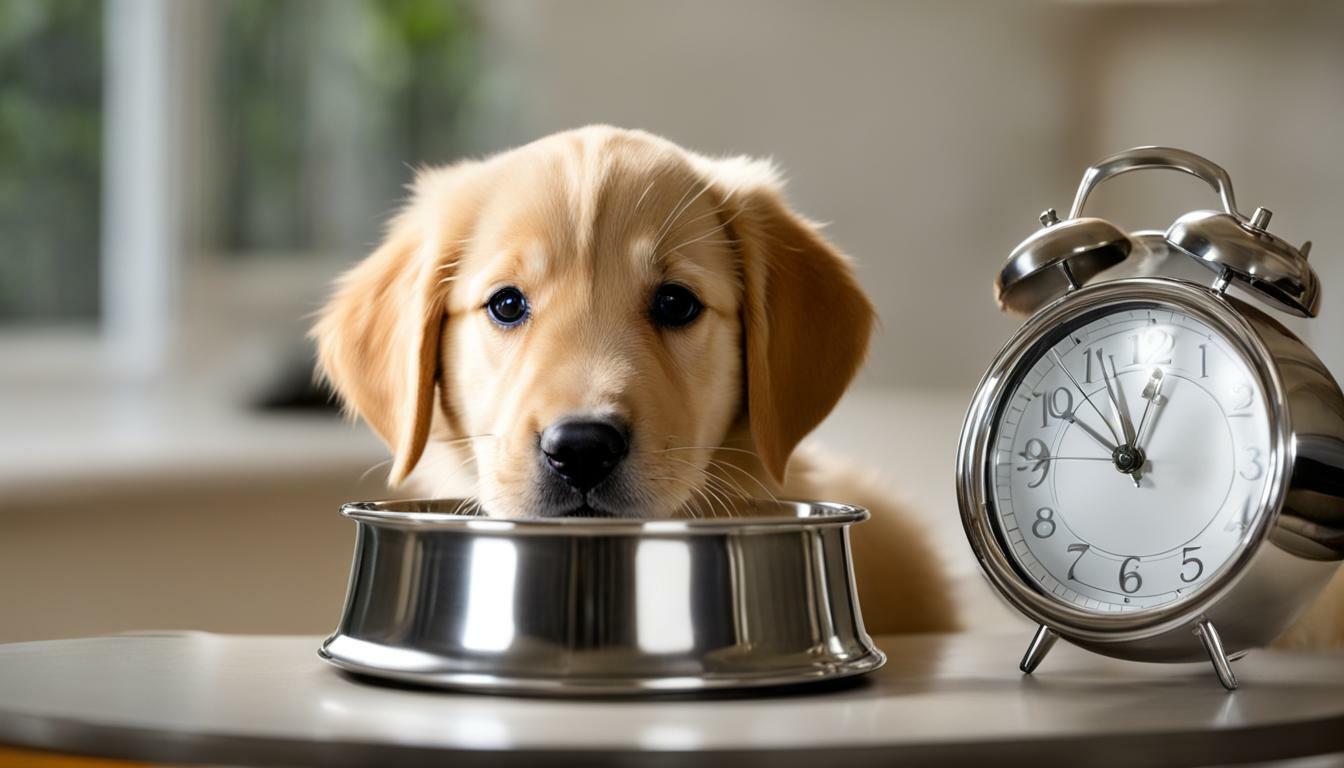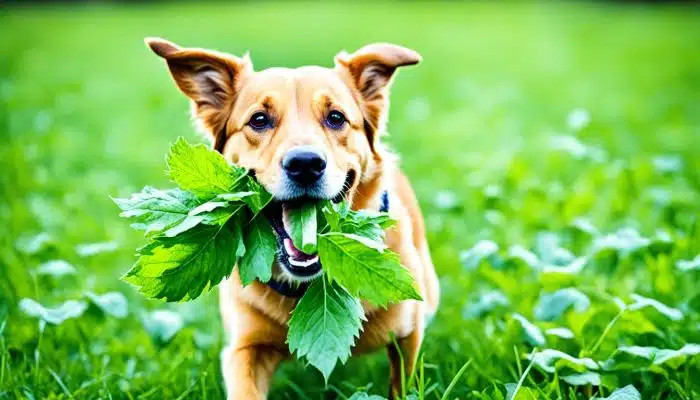As a new owner of a golden retriever puppy, you may be wondering how much and how often you should be feeding them. Providing the right amount of food at the correct intervals is essential for your furry friend’s growth and overall health. In this section, I will share some golden retriever puppy feeding guidelines to ensure they receive the proper nutrition they need.
Key Takeaways:
- Establishing a feeding schedule is important for your golden retriever puppy’s health.
- Feeding your puppy the right amount of food depends on their age, weight, and activity level.
- Overfeeding or underfeeding can lead to health problems, so it’s crucial to monitor their intake.
- Consulting with a veterinarian can provide personalized feeding recommendations for your golden retriever puppy.
- Providing a balanced diet and avoiding common feeding mistakes can help keep your puppy healthy and happy.
Creating a Feeding Schedule for Your Golden Retriever Puppy
Welcome back! Now that we have talked about how much and how often to feed your golden retriever puppy, let’s create a feeding schedule. Remember, establishing a routine will not only make mealtime predictable for your pup, but it will also give you a chance to monitor their eating habits.
Recommended Feeding Frequency for Golden Retriever Puppies
Golden retriever puppies require three to four meals per day until they are four months old. After four months, reduce the frequency to two to three meals per day. Avoid leaving food out all day, as it can lead to overeating and obesity.
Golden Retriever Puppy Meal Plan
When creating a meal plan, consider your puppy’s age, weight, and activity level. It is best to feed them a high-quality commercial puppy food that meets AAFCO (Association of American Feed Control Officials) standards. Look for food with high protein content and quality sources of fat. Avoid food that contains fillers, artificial preservatives, and by-products.
| Age (months) | Meals per day | Amount per meal (cups) |
|---|---|---|
| 2-3 | 4 | 1/4 – 1/2 |
| 4-5 | 3 | 1/2 – 1 |
| 6-8 | 3 | 1 – 1 1/2 |
| 8-12 | 2-3 | 1 – 2 |
Feeding Tips for Golden Retriever Puppies
Here are a few tips to make mealtime more enjoyable for your furry friend:
- Feed your puppy in a quiet, distraction-free environment.
- Use a designated feeding area and a stainless-steel or ceramic bowl.
- Measure your puppy’s food carefully to avoid overfeeding.
- Feed them at the same time every day to establish a routine.
- Don’t forget to provide fresh, clean water at all times.
Congratulations! You now have a basic understanding of how to create a feeding schedule for your golden retriever puppy. In the next section, we will dive deeper into the nutritional requirements for golden retriever puppies.
Understanding the Nutritional Requirements of Golden Retriever Puppies
Golden retriever puppies require a balanced diet to support their growth and development. A high-quality commercial dog food that meets the Association of American Feed Control Officials (AAFCO) standards is generally recommended for their overall well-being.
The best diet for golden retriever puppies should contain a balanced ratio of proteins, carbohydrates, fats, vitamins, and minerals. Puppies need more protein compared to adult dogs as it supports muscle growth and repair. Look for a food that has at least 22% protein content. Carbohydrates provide energy and fiber. Choose a food with high-quality carbohydrates such as brown rice, sweet potatoes, and barley. Fats provide essential fatty acids that help in the absorption of vitamins and minerals and provide energy. However, too much fat can lead to obesity. Aim for a food that has about 5-10% fat.
Vitamins and minerals are also essential for golden retriever puppies. They need vitamins A, C, D, E, and K, as well as minerals like calcium, phosphorus, and iron. These help in bone development, immune system support, and overall health.
It’s important to note that not all golden retriever puppies have the same nutritional requirements. Factors including their age, weight, and activity level can affect their diet. Additionally, some puppies may have certain health conditions that require special diets or supplements. Consulting with your veterinarian can help you determine the appropriate diet for your furry friend.
Determining the Right Portion Sizes for Golden Retriever Puppies
Feeding your golden retriever puppy with the appropriate portion sizes is crucial for maintaining their healthy weight and preventing obesity or malnutrition. However, there is no one-size-fits-all approach when it comes to determining how much to feed your puppy, as various factors can influence their portion sizes.
First, consider your puppy’s age, weight, and activity level. Puppies typically need to eat more frequently than adult dogs, so plan to feed them three to four times a day. As they age, you can gradually decrease the frequency of their meals until they reach adult feeding schedules of twice a day.
Next, identify what type of food you are feeding your golden retriever puppy. Different types of food have varying calorie counts, which can affect how much you should feed your puppy. Check the feeding guidelines on the food packaging, as these often provide recommendations based on your puppy’s weight and age.
It’s also important to monitor your puppy’s weight regularly to ensure they are not over or underfed. If you notice that your puppy is gaining too much weight, adjust their portion sizes accordingly. On the other hand, if they are losing weight or seem to be hungry all the time, consider increasing their food intake.
Remember that every puppy is unique, and their nutritional needs can vary. Consulting with your veterinarian can provide you with personalized recommendations for your specific puppy.
In summary, when determining the appropriate portion sizes for your golden retriever puppy, consider their age, weight, activity level, type of food, and monitor their weight regularly. With these factors in mind, you can ensure that your furry friend receives the right amount of food for their growth and development.
Identifying Signs of Overfeeding or Underfeeding in Golden Retriever Puppies
Feeding your golden retriever puppy the right amount of food is essential for their health and well-being. However, it can be challenging to determine the appropriate feeding amounts for your furry friend. If you provide too much food, your puppy may become overweight or obese, leading to potential health problems. On the other hand, an inadequate amount of food can result in malnourishment and stunted growth.
The best way to determine the appropriate feeding amounts for your golden retriever puppy is by considering their age, weight, and activity level. Puppies that are more active require more calories, while less active puppies require fewer calories. It is essential to monitor their feeding amounts and adjust as necessary to ensure they maintain a healthy weight.
There are several signs you can look out for to determine if you are overfeeding or underfeeding your golden retriever puppy. For instance, if your puppy is gaining weight rapidly, they may be consuming too much food. On the other hand, if they seem lethargic or fail to gain weight, they may not be consuming enough food.
It is crucial to follow a feeding schedule and measure out your puppy’s food portions to avoid overfeeding or underfeeding. You may also consult with your veterinarian to determine the appropriate feeding amounts for your golden retriever puppy’s specific needs.
Remember that every puppy is unique and may require different feeding amounts. By monitoring their weight and feeding amounts and adjusting accordingly, you can ensure that your golden retriever puppy receives the right amount of food for a healthy and happy life.
Common Feeding Mistakes to Avoid for Golden Retriever Puppy Owners
Feeding your golden retriever puppy can be fun and rewarding, but it’s important to avoid common mistakes to ensure their health and happiness. Here are some golden retriever puppy feeding guidelines and feeding tips to help you avoid these common mistakes:
Avoid Overfeeding Your Puppy
One of the most common mistakes new golden retriever puppy owners make is overfeeding their furry friend. It’s important to remember that puppies have small stomachs and should be fed small portions frequently throughout the day.
Feeding your puppy too much can lead to obesity, which can cause joint problems, diabetes, and other health issues. Follow the recommended feeding schedule for golden retriever puppies and use an appropriate measuring cup to ensure you’re not giving your puppy more than they need.
Stick to a Consistent Feeding Schedule
Another common mistake is not sticking to a consistent feeding schedule. Golden retriever puppies thrive on routine, and feeding them at the same times each day helps them settle into a predictable routine. Create a meal plan and stick to it to help your puppy adjust quickly to their new home.
Choose High-Quality Puppy Food
Choosing the right food for your golden retriever puppy is critical to their health. Look for high-quality puppy food that provides the right balance of nutrients your puppy needs. Avoid cheap dog food, which may contain fillers and additives that can be harmful to your puppy’s health.
Consult with your veterinarian for recommendations on the best diet for your puppy as they grow and their nutritional needs change.
Don’t Feed Your Puppy Human Food
It can be tempting to share your meal with your furry friend, but it’s important to resist the urge to feed them human food. Many human foods are toxic to dogs and can cause serious health problems.
Feeding your puppy table scraps can also disrupt their balanced diet and lead to obesity. Instead, stick to feeding them high-quality puppy food and treats made specifically for dogs.
Provide Fresh Water at All Times
Golden retriever puppies need access to fresh water at all times. Make sure to provide them with a clean bowl of fresh water and change it frequently to keep it clean and free of bacteria.
During hot weather or periods of increased activity, your puppy may need more water to stay hydrated. Keep an eye on their water bowl and refill it as needed.
By keeping these golden retriever puppy feeding guidelines and feeding tips in mind, you can help your furry friend grow up healthy and happy. Remember, consult with your veterinarian for personalized feeding recommendations for your specific puppy’s needs.
Introducing a Balanced Diet and Nutritional Supplements for Golden Retriever Puppies
Feeding your golden retriever puppy a well-balanced diet is crucial to their overall health and well-being. Providing them with a variety of high-quality proteins, whole grains, fruits, and vegetables can help ensure they receive all the necessary nutrients they need to thrive.
When it comes to choosing the best diet for your golden retriever puppy, it’s important to consider their specific nutritional needs. Puppies require more protein and fat than adult dogs to support their growth and development. Look for puppy-specific formulas of commercial dog food that meet the Association of American Feed Control Officials (AAFCO) standards.
If you prefer to prepare homemade meals for your furry friend, consult with a veterinarian or canine nutritionist to ensure their meals are nutritionally balanced. Adding nutritional supplements, such as vitamins and minerals, can also be beneficial in meeting their dietary needs.
Some of the best dietary supplements for golden retriever puppies include:
| Supplement | Benefits |
|---|---|
| Fish oil | Provides omega-3 fatty acids for healthy skin and coat, cognitive function, and joint health. |
| Probiotics | Supports digestive health and immune system function. |
| Glucosamine and chondroitin | Can aid in joint health and mobility. |
Remember to always consult with a veterinarian before adding any supplements to your puppy’s diet.
Incorporating a balanced diet and nutritional supplements can help ensure your golden retriever puppy grows into a healthy and happy adult. With proper feeding and care, your furry friend can live a long and fulfilling life by your side.
Conclusion
Taking care of a golden retriever puppy involves providing them with adequate nutrition and a balanced diet. As a responsible owner, you must establish a feeding schedule and understand their specific nutritional requirements. By avoiding common feeding mistakes and monitoring their portion sizes, you can help your furry friend maintain a healthy weight.
Remember to consult with your veterinarian for personalized feeding recommendations, especially if your golden retriever puppy has specific health concerns or dietary needs. With proper care and attention, you can ensure that your golden retriever puppy grows into a healthy and happy adult dog.
FAQ
How much should I feed my golden retriever puppy?
The amount of food to feed your golden retriever puppy depends on their age, weight, and activity level. It is recommended to follow the feeding guidelines provided by the specific brand of puppy food you are using. Generally, puppies between 8 and 12 weeks old should be fed three to four times a day, while puppies older than 12 weeks can be fed two to three times a day. Monitor your puppy’s weight and adjust the portion sizes accordingly.
How often should I feed my golden retriever puppy?
Golden retriever puppies should be fed multiple small meals throughout the day to support their growth and digestion. Puppies between 8 and 12 weeks old should be fed three to four times a day, while puppies older than 12 weeks can be fed two to three times a day. Avoid leaving food out all day as it can lead to overeating or picky eating habits.
What should I include in a golden retriever puppy’s diet?
A balanced diet for a golden retriever puppy should consist of high-quality puppy food that meets their specific nutritional requirements. Look for a puppy food that contains essential nutrients like protein, fats, carbohydrates, vitamins, and minerals. It is best to consult with your veterinarian for recommendations on the best brand and type of food for your golden retriever puppy.
How do I determine the right portion sizes for my golden retriever puppy?
The right portion sizes for your golden retriever puppy depend on factors like age, weight, and activity level. Start by following the feeding guidelines provided by the specific brand of puppy food you are using. Monitor your puppy’s weight and adjust the portion sizes as necessary. It is important to prevent overfeeding or underfeeding to ensure your puppy maintains a healthy weight.
What are the signs of overfeeding or underfeeding in golden retriever puppies?
Signs of overfeeding in golden retriever puppies may include rapid weight gain, increased frequency of bowel movements, and excess energy. On the other hand, signs of underfeeding may include slow weight gain, lethargy, and a visible ribcage. Monitor your puppy’s weight and body condition to ensure they are receiving the right amount of food. Consult with your veterinarian if you have concerns.
What are some common feeding mistakes to avoid for golden retriever puppy owners?
Some common feeding mistakes to avoid for golden retriever puppy owners include free-feeding or leaving food out all day, feeding inappropriate human foods, overfeeding treats, and not following a consistent feeding schedule. Stick to a regular feeding routine, provide a balanced puppy food diet, and limit treats to prevent potential health issues.
Should I add nutritional supplements to my golden retriever puppy’s diet?
In most cases, a well-balanced puppy food diet should provide all the necessary nutrients for your golden retriever puppy’s growth and development. However, there may be certain situations where your veterinarian recommends additional nutritional supplements. Consult with your vet before adding any supplements to your puppy’s diet to ensure they are safe and appropriate.





